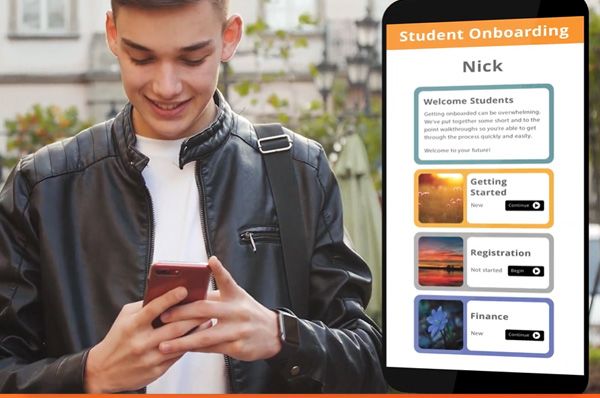
In today’s competitive educational landscape, universities and colleges are constantly seeking innovative ways to enhance the student experience from the very first day on campus. Student onboarding, particularly during the pivotal period spanning from move-in day to orientation, sets the tone for the entire academic journey. It’s a time when students transition from anticipation to engagement, from uncertainty to belonging. As educational institutions strive to differentiate themselves and prioritize student success, the development of creative onboarding strategies emerges as a crucial endeavor.
Understanding the Significance of Onboarding
Onboarding students is not merely about logistics; it’s about fostering a sense of community, connection, and purpose. It’s the initial touchpoint where institutions have the opportunity to demonstrate their commitment to student well-being and success. Effective onboarding sets the stage for academic achievement, social integration, and overall satisfaction. By recognizing the significance of this transitional phase, institutions can proactively design comprehensive onboarding programs that address the diverse needs and expectations of incoming students.
Rethinking Move-In Day: Beyond Logistics to Experience
Traditionally viewed as a logistical necessity, move-in day represents a prime opportunity for institutions to initiate meaningful interactions with new students and their families. Transitioning from the chaos of unpacking to the warmth of welcome, universities can orchestrate personalized move-in experiences that ease the transition and foster a sense of belonging. From personalized greetings to student-led assistance, every interaction on move-in day contributes to the narrative of inclusivity and support.
Personalized Welcome Initiatives
Embracing the power of personalization, universities can implement various initiatives to extend a warm welcome to incoming students. Handwritten notes from faculty members, welcome packages tailored to individual interests, and personalized campus tours create memorable moments that resonate long after move-in day. By acknowledging the uniqueness of each student’s journey, institutions signal their commitment to cultivating a supportive and inclusive community.
Student-Led Support Networks
Empowering current students to serve as mentors and guides during move-in day exemplifies the spirit of peer support and camaraderie. Student-led support networks, comprising resident assistants, orientation leaders, and peer mentors, offer invaluable insights and assistance to newcomers navigating the complexities of campus life. Through shared experiences and genuine connections, these peer relationships lay the foundation for enduring friendships and a sense of belonging.
Elevating Orientation: From Information Overload to Engaging Experiences
While orientation serves as an essential introduction to academic policies and campus resources, its true value lies in the opportunity to engage students intellectually, socially, and emotionally. By reimagining orientation as a dynamic and interactive experience, institutions can foster a culture of engagement and exploration from day one.
Interactive Workshops and Activities
Incorporating interactive workshops and activities into the orientation agenda encourages active participation and meaningful dialogue among students. From team-building exercises to interactive seminars on campus culture, these immersive experiences empower students to connect with peers, explore diverse perspectives, and envision their academic journey with clarity and purpose.
Peer Mentorship Programs
Establishing peer mentorship programs as integral components of orientation reinforces the sense of community and support that defines the university experience. Pairing incoming students with seasoned mentors facilitates peer-to-peer learning, social integration, and adjustment to academic life. By fostering authentic connections and providing ongoing support, peer mentorship programs empower students to navigate challenges and embrace opportunities with confidence.
Embracing Innovation: The Future of Onboarding
As higher education continues to evolve, so too must the strategies for onboarding. Embracing innovation and adaptability enables institutions to anticipate and address the evolving needs and preferences of incoming students. By leveraging technology, data analytics, and best practices in student engagement, universities can cultivate an onboarding experience that transcends tradition and fosters excellence.
Leveraging Technology for Personalization
In an era characterized by digital connectivity, universities can harness the power of technology to personalize the onboarding experience and streamline communication channels. From virtual campus tours to interactive orientation modules, technology-enabled initiatives cater to the diverse learning styles and preferences of incoming students. By integrating user-friendly platforms and interactive content, institutions enhance accessibility and engagement throughout the onboarding process.
Data-Driven Insights for Continuous Improvement
Utilizing data analytics and feedback mechanisms provides invaluable insights into the efficacy of onboarding strategies and areas for improvement. By collecting and analyzing student feedback, institutions gain a comprehensive understanding of the onboarding experience from the perspective of the end user. This data-driven approach enables continuous refinement and optimization of onboarding initiatives, ensuring alignment with evolving student expectations and institutional goals.

Conclusion
The journey from move-in day to orientation represents a transformative period of transition and discovery for incoming students. By embracing innovation, personalization, and collaboration, institutions can redefine student onboarding as a cornerstone of the educational experience. Through meaningful interactions, engaging experiences, and a commitment to excellence, universities lay the groundwork for student success and lifelong engagement.
Contact us and learn how Optimum can streamline your onboarding processes.